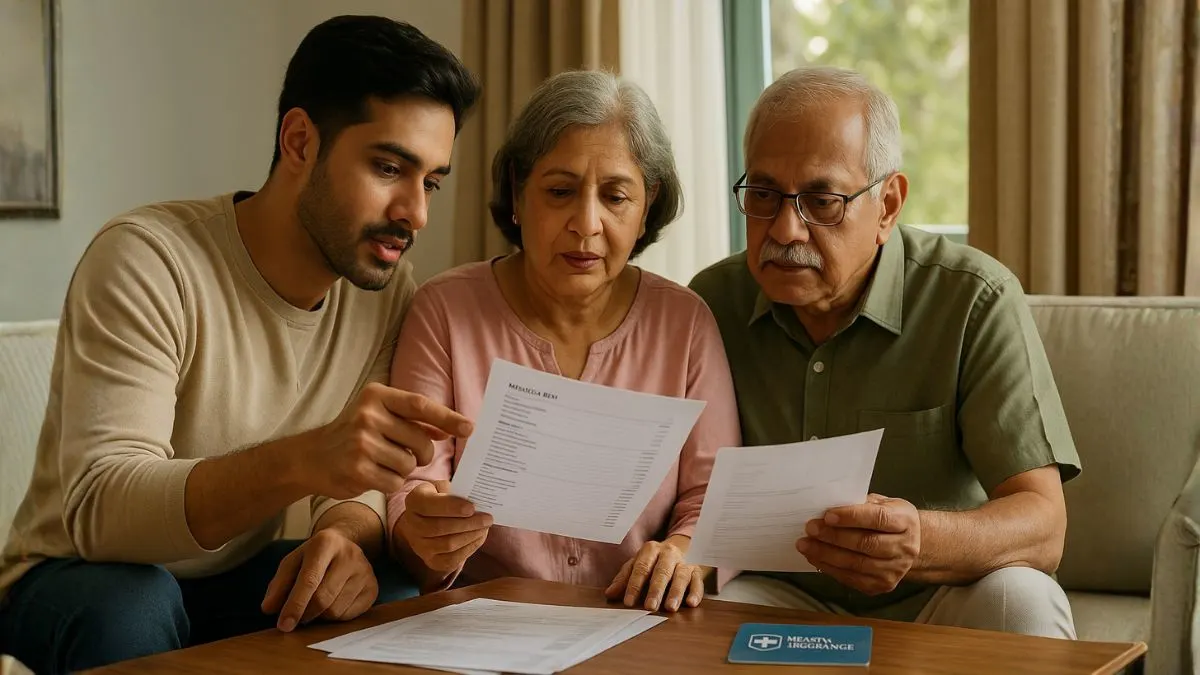
Health and wealth — both are important, but one medical emergency can shake both at once.
That’s why the government encourages you to protect your health with medical insurance (Mediclaim) — and rewards you with a tax deduction for it.
If you’ve ever wondered “Which section of the Income Tax Act gives me Mediclaim benefits?” — the answer lies in Section 80D.
This section is your financial safety net — it helps you claim deductions for health insurance premiums & medical expenses for yourself, your family, and even your parents.
Let’s understand this in simple, practical language.
What Is Section 80D of the Income Tax Act?
Section 80D deals with sections of medical claims in the Income Tax Act.
It allows individuals & Hindu Undivided Families (HUFs) to claim a tax deduction on Mediclaim policies — that is, health insurance premiums paid for self, spouse, children, and parents.
It’s one of the most commonly used tax-saving options, yet many taxpayers don’t use it to its full potential.
The government introduced it to promote health awareness & reduce the burden of medical expenses — something that’s increasingly crucial in today’s times.
How Much Deduction Can You Claim?
The Mediclaim deductions under Section 80D depend on who you’re paying the premium for:
|
Category |
Maximum Deduction |
|
Self, Spouse, and Dependent Children |
₹25,000 per year |
|
Parents (if below 60 years) |
₹25,000 per year |
|
Parents (if senior citizens above 60 years) |
₹50,000 per year |
|
If both taxpayer and parents are senior citizens |
₹1,00,000 total |
So, Mediclaim deductions of a maximum of ₹25,000 per year are available for most people — & double that if your parents are senior citizens.
That’s not a small amount when you add it to your other deductions under Sections like 80C or 80CCD.
Also Read: Gift of tax relief on investment in NPS!
Who Can Claim This Deduction?
Section 80D is open to both individual taxpayers & Hindu Undivided Families (HUFs).
If you pay health insurance premiums for:
- Yourself
- Your spouse
- Your dependent children
- Your parents
—you’re eligible to claim it.
But remember: cash payments don’t qualify. You must make payments via cheque, net banking, UPI, or debit/credit card to get the deduction. (Cash is only allowed for preventive health check-ups.)
What Expenses Are Covered Under Section 80D?
Section 80D covers not just Mediclaim policy premiums but also certain other medical expenses:
- Health Insurance Premiums (Mediclaim Policy)
– Paid to approved insurers for self, family, or parents.
– Must be paid through banking channels. - Preventive Health Check-Ups
– Up to ₹5,000 per year (included within the ₹25,000/₹50,000 limit).
– Payment can be made in cash. - Medical Expenses for Senior Citizens
– If no health insurance exists, actual medical expenses can be claimed (up to ₹50,000).
So even if your parents don’t have an insurance policy but you pay for their hospital bills — you can still get a deduction.
Example: How to Calculate Your 80D Benefit
Let’s take an example:
Rahul pays ₹20,000 as health insurance premium for himself & ₹45,000 for his senior citizen parents.
He can claim:
- ₹20,000 (self family) ₹45,000 (parents) = ₹65,000 total deduction under Section 80D.
That’s ₹65,000 of taxable income saved — meaning nearly ₹13,000–₹20,000 saved in tax, depending on his income bracket.
Small investments, big benefits.
Why the Government Offers This Deduction
Healthcare costs are skyrocketing. A single hospital admission can cost more than a month’s salary.
So, Section 80D is not just about tax saving — it’s about promoting responsible financial planning.
By offering this deduction, the government encourages citizens to:
- Buy Mediclaim policies early,
- Keep themselves & their families covered,
- Reduce dependence on government hospitals.
It’s a reward for being prepared.
Also Read: An Exclusive Tax Benefit for NPS Subscribers
Mediclaim vs. Medical Reimbursement — Know the Difference
Many people confuse Mediclaim deduction with medical reimbursement received from employers.
Here’s the difference:
|
Basis |
Mediclaim (80D) |
Medical Reimbursement (Employer) |
|
Source |
Personal insurance policy |
Employer-provided benefit |
|
Limit |
₹25,000 to ₹1,00,000 (depends on age) |
Earlier ₹15,000 (now covered under standard deduction) |
|
Section |
80D |
10(14) / Salary head |
|
Payment Method |
Paid by individual |
Paid by employer |
So, Mediclaim under Section 80D is something you claim on your own — regardless of whether your employer provides health insurance or not.
Section 80D for Senior Citizens and Parents
Parents often get ignored in tax planning — but this section ensures they don’t."
If you’re paying for your parents’ health insurance:
- You can claim an additional ₹25,000 (if they’re below 60).
- Or ₹50,000 if they’re senior citizens.
And if your parents aren’t insured, but you’re paying for their medical bills or hospital expenses, that still qualifies under Section 80D — provided the expenses are genuine & paid through proper channels.
Preventive Health Check-Up — The Hidden Gem
Most taxpayers miss this part.
You can claim up to ₹5,000 per year for preventive health check-ups for yourself, your family, or your parents.
This includes routine tests like blood sugar, cholesterol, ECG, or annual body check-ups — even if no major treatment is done.
These ₹5,000 fit within the main 80D limit, but still — every bit helps when it comes to optimizing your tax planning.
Mediclaim for HUF (Hindu Undivided Family)
Even HUFs can claim deductions for Mediclaim premiums paid for any member of the family.
The limit remains ₹25,000 or ₹50,000 depending on the age of the insured member.
So if you run a family business & have a Mediclaim policy for family members, you can legally reduce your taxable income under Section 80D.
Also Read: Tax Benefits for Families of Persons with Disabilities
Documents You Need to Claim 80D
Before you file your ITR, keep these handy:
- Policy premium receipt (mentioning name & relation of insured).
- Bank statement showing payment.
- Copy of preventive check-up invoice (if applicable).
- Proof of parents’ age (for senior citizen claim).
The Income Tax Department may not always ask for these upfront, but it’s best to have them ready in case of scrutiny.
Common Mistakes Taxpayers Make
- Paying in cash: Only preventive check-ups qualify; premiums must be digital.
- Claiming twice: If your employer reimburses you, you can’t claim it again personally.
- Forgetting parents’ insurance: The easiest missed deduction.
- Not updating policy details: Old names or expired policies can nullify your claim.
These small oversights can cost you thousands in missed tax savings.
Why You Shouldn’t Wait Until March
Most people rush to buy insurance in March — just to save tax. But health insurance isn’t just a deduction tool.
Buy it early:
- You get lower premiums,
- Fewer medical checks,
- And coverage starts immediately (no waiting period surprises).
The earlier you invest in Mediclaim, the bigger the benefit — both for your health & your taxes.
Mediclaim and Other Related Sections
While Section 80D is the primary clause for Mediclaim, a few other sections indirectly complement it:
- Section 80DDB – Covers deductions for treatment of specified diseases.
- Section 80U – For individuals with disabilities.
- Section 10(46A) – Certain health authorities’ income exemption.
Together, they create a comprehensive health-focused framework in India’s tax system.
Pro Tip — Combine with Family Floater
If you have multiple family members, consider a family floater plan — it’s cheaper than individual Mediclaims & still fully eligible under Section 80D.
You can also stack benefits by:"
- Taking one policy for self spouse kids.
- Another for parents.
Both will qualify separately under the section’s limits.
Also Read: Physically Handicapped Allowance Exemption in Income Tax: Sections 80U & 80DD
A Real-Life Scenario
Let’s meet Sneha, a 35-year-old professional.
She pays ₹18,000 as premium for her own family’s policy and ₹45,000 for her retired parents.
When she files her ITR:
✅ She claims ₹18,000 ₹45,000 = ₹63,000 under Section 80D.
✅ That reduces her taxable income by ₹63,000.
✅ At 30% tax slab, she saves nearly ₹18,900 in taxes.
That’s like getting a 30% discount on her insurance — just by knowing the right section!
Final Thoughts
If you’re investing in your health, the government wants to support you — & Section 80D of the Income Tax Act makes that possible. Whether you’re paying for your own policy or your parents’, these Mediclaim deductions of a maximum of ₹25,000 per year (or more, for senior citizens) can make a huge difference. It’s one of the most practical, humane tax-saving provisions — rewarding you for taking care of your family’s well-being.
Still confused about how much deduction you can claim under Mediclaim Income Tax Section 80D?
Let our experts at Callmyca.com review your health insurance & help you claim the maximum legal benefit.
Because your health deserves care — and your tax deserves savings. 💡









